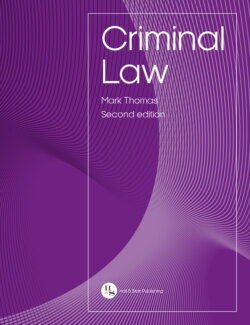Читать книгу Criminal Law - Mark Thomas - Страница 100
На сайте Литреса книга снята с продажи.
Withdrawal of life support: act or omission?
ОглавлениеAnother example worthy of consideration is that of withdrawing life support treatment and whether this amounts to an act or omission. Our authority on this point is the case of Airedale NHS Trust v Bland [1993] AC 789 (see also the case of Dr Arthur (1981) 12 BMLR 1).
case example
Charge: n/a. Declaration sought to withdraw life-saving treatment
Case progression: High Court – Declaration granted
Court of Appeal – Appeal dismissed
House of Lords – Appeal dismissed
Point of law: Whether withdrawing life support treatment amounts to murder
In Airedale NHS Trust v Bland [1993] AC 789, Anthony Bland was injured in the Hillsborough Stadium disaster, suffering irreversible brain damage, and as a result was in a persistent vegetative state (PVS). The doctors confirmed that there was no hope of recovery or improvement in his case. The doctors, with the support of Anthony’s parents, sought a declaration to withdraw life-saving treatment and to allow Anthony to die.
Stephen Brown P in the High Court granted the declaration which was appealed by the Official Solicitor to the Court of Appeal on the basis that a withdrawal of treatment would amount to murder. The Court of Appeal dismissed the appeal of the Official Solicitor, who then appealed to the House of Lords asking the question as to whether such withdrawal was a positive act or omission and whether it amounted to murder. The House of Lords dismissed the appeal and reaffirmed the declaration to allow Anthony to die.
Lord Goff answered the question as follows:
I agree that the doctor’s conduct in discontinuing life support can properly be categorised as an omission. It is true that it may be difficult to describe what the doctor actually does as an omission, for example where he takes some positive step to bring the life support to an end. But discontinuation of life support is, for present purposes, no different from not initiating life support in the first place. In each case, the doctor is simply allowing his patient to die in the sense that he is desisting from taking a step which might, in certain circumstances, prevent his patient from dying as a result of his pre-existing condition: and as a matter of general principle an omission such as this will not be unlawful unless it constitutes a breach of duty to the patient.
The removal of treatment, therefore, is considered as being an omission. One can explain the decision in Airedale in the following manner:
•A doctor, responsible for the patient’s health, will not be considered as committing an act in circumstances where they withdraw treatment. The removal (or ‘discontinuation’) of treatment is to be treated in the same way as if treatment was never given in the first place. In this regard, the conduct of the doctor is to be considered an omission.
•On the other hand, should a third party turn off the life support machine (eg such as a jealous ex-partner), this is likely to be considered an act, as opposed to an omission.
This latter point was made by Lord Goff in the following terms:
I also agree that the doctor’s conduct is to be differentiated from that of, for example, an interloper who maliciously switches off a life support machine because, although the interloper may perform exactly the same act as the doctor who discontinues life support, his doing so constitutes interference with the life-prolonging treatment then being administered by the doctor. Accordingly, whereas the doctor, in discontinuing life support, is simply allowing his patient to die of his pre-existing condition, the interloper is actively intervening to stop the doctor from prolonging the patient’s life, and such conduct cannot possibly be categorised as an omission.
Butler-Sloss P in NHS Trust A v M [2001] Fam 348 confirmed the principles in Bland and found that a failure to provide medical treatment will not be incompatible with Article 2 of the ECHR (the right to life) in circumstances where the continuation of life is not in the best interests of the patient.
The distinction between acts and omissions following Bland has been criticised by the likes of Ashworth (‘The Scope of Criminal Liability for Omissions’ (1989) 105 LQR 424) who argues:
Whether we term certain events ‘acts’ or ‘omissions’ may be both flexible in practice and virtually insoluble in theory: for example, does a hospital nurse who decides not to replace an empty bag for a drip feed make an omission, whilst a nurse who switches off a ventilator commits an act? It would seem wrong that criminal liability or non-liability should turn on such fine points, which seem incapable of reflecting any substantial moral distinctions in a context where the preservation of life is generally paramount. … The proper solution is not to warp the concepts of omission, duty, knowledge and causation, but to provide for such cases to be determined on new principles of justification. This would require the courts to be explicit about the grounds for exonerating doctors or nurses, rather than concealing the reasons behind the act/omission distinction. (emphasis added)
